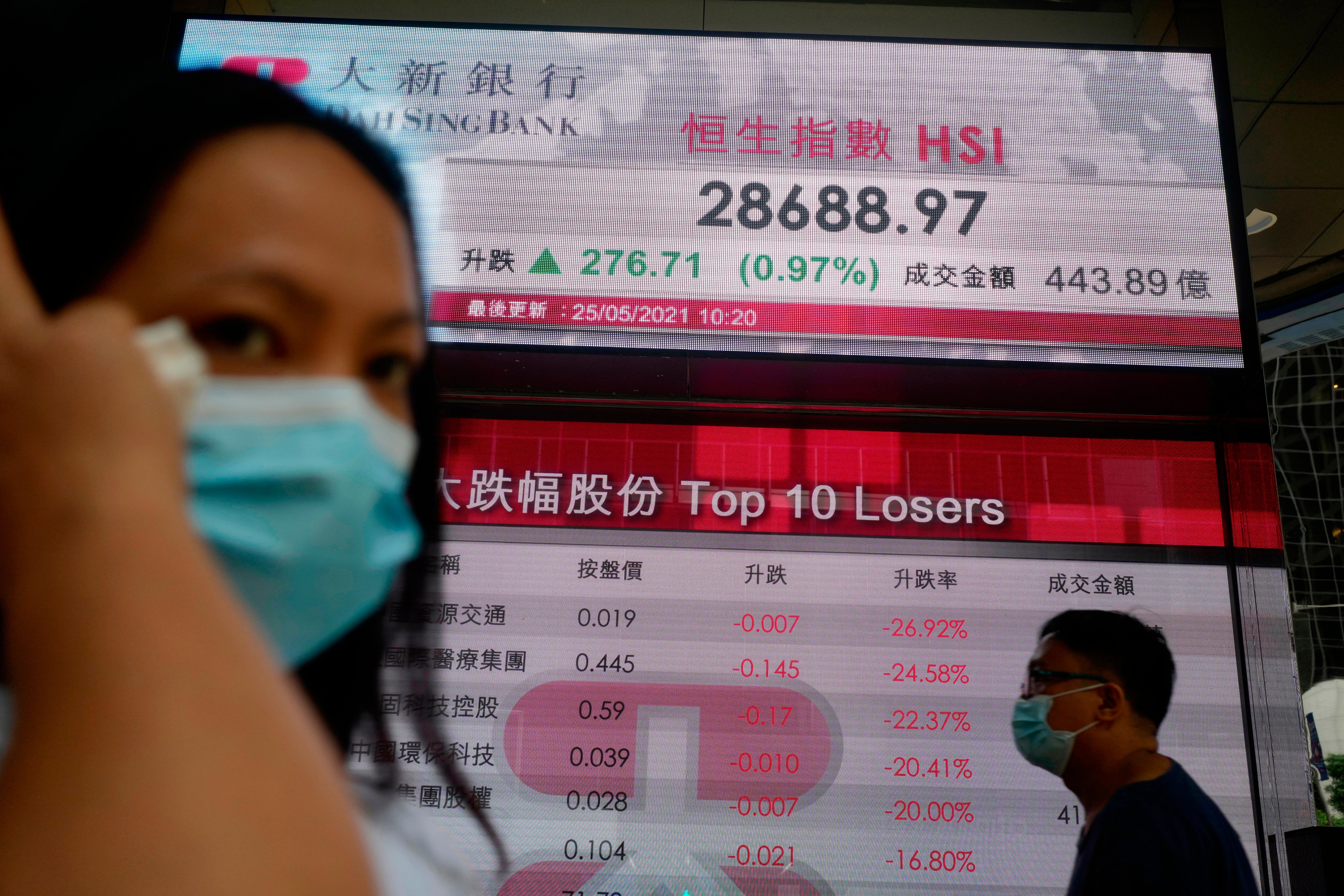Asian stocks follow Wall St higher as inflation fears ease
Asian stock markets have followed Wall Street higher as inflation fears eased and investors regained an appetite for risk

Your support helps us to tell the story
From reproductive rights to climate change to Big Tech, The Independent is on the ground when the story is developing. Whether it's investigating the financials of Elon Musk's pro-Trump PAC or producing our latest documentary, 'The A Word', which shines a light on the American women fighting for reproductive rights, we know how important it is to parse out the facts from the messaging.
At such a critical moment in US history, we need reporters on the ground. Your donation allows us to keep sending journalists to speak to both sides of the story.
The Independent is trusted by Americans across the entire political spectrum. And unlike many other quality news outlets, we choose not to lock Americans out of our reporting and analysis with paywalls. We believe quality journalism should be available to everyone, paid for by those who can afford it.
Your support makes all the difference.Asian stock markets followed Wall Street higher Tuesday as inflation fears eased and investors regained an appetite for risk. Market benchmarks in Shanghai Tokyo Hong Kong and Seoul advanced.
Overnight, Wall Street’s benchmark S&P 500 index rose 1%, recovering about half of last week’s losses. Gains were led by tech stocks.
Investors worry a global economic recovery might be hampered if rising inflation prompts governments and central banks to withdraw stimulus. But a Federal Reserve official helped to allay some of those fears when he said Tuesday the U.S. central bank shouldn’t look at changing policy in the midst of the coronavirus pandemic.
“U.S. markets delivered a positive start for the week, as easing inflation concerns drive a bounce in tech,” said Yeap Jun Rong of IG in a report.
The Shanghai Composite Index rose 1.8% to 3,558.89 while the Nikkei 225 in Tokyo gained 0.5% to 28,501.74. The Hang Seng in Hong Kong advanced 1.4% to 28,802.71.
The Kospi in Seoul was 0.6% to 3,162.70 and the S&P-ASX 200 in Sydney added 0.6% to 7,090.90.
India’s Sensex opened 0.2% higher at 50,738.86. New Zealand declined while Southeast Asian markets advanced.
Stocks fell after hitting a record high May 7 amid growing concern higher inflation as economies revive would disrupt commerce or prompt governments to roll back stimulus spending and easy credit.
On Monday, the president of the St. Louis Federal Reserve Bank, James Bullard, told Yahoo Finance more inflation was “not really a surprise” and it wasn’t time to rethink monetary policy.
Fed officials said earlier the U.S. economy would be allowed to “run hot,” with inflation above the central bank’s 2% target, to ensure a recovery is established.
“I think there will come a time when we can talk more about changing the parameters of monetary policy,” Bullard said. “I don’t think we should do it when we’re still in the pandemic.”
The S&P 500 rose to 4,197.05. The index is now on track for a 0.4% monthly gain as the latest quarterly profit-reporting season nears an end.
The Dow Jones Industrial Average added 0.5% to 34,393.98. The tech-heavy Nasdaq Composite gained 1.4% to 13,661.17.
Nvidia rose 4.1%, while Micron Technology added 2.7%. Among communication stocks, Facebook gained 2.7% and Twitter jumped 4.8%.
Companies that rely on direct consumer spending made solid gains, while sectors that are viewed as safe havens such as utilities lagged.
Bond yields, or the difference between the market price and the payout at maturity, fell as prices rose. That often is taken as a sign investors are less concerned about inflation, which can erode the value of that payout.
On Friday, the Commerce Department releases one of its inflation gauges, the personal consumption and expenditures index, or Core PCE. The Fed prefers that tool to measure inflation, instead of the consumer price index released earlier in the month.
Economists surveyed by FactSet expect Core PCE to be up 3% from a year ago, which would be above the Fed target.
In energy markets, benchmark U.S. crude gained 8 cents to $66.13 per barrel in electronic trading on the New York Mercantile Exchange. The contract rose $2.47 to $66.05 on Monday. Brent crude, the price basis for international oils, gained 12 cents to $68.49 per barrel in London. It added $2.02 the previous session to $68.46.
The dollar declined to 108.74 yen from Monday’s 108.79 yen. The euro rose to $1.2230 from $1.2213.